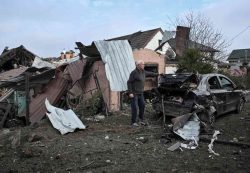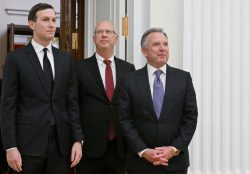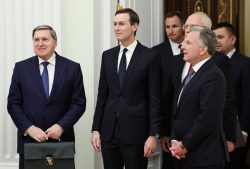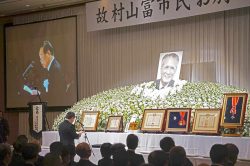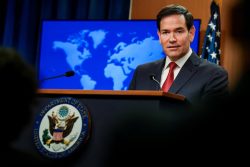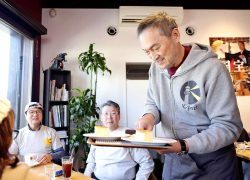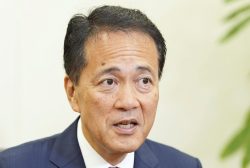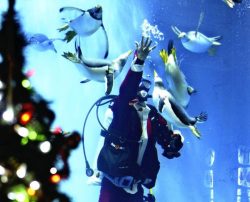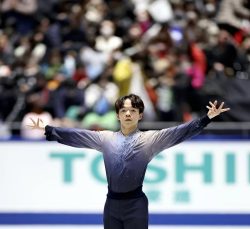Kim Jong Un Arrives in Russian City of Komsomolsk-on-Amur for Expected Visit to Fighter Jet Plant
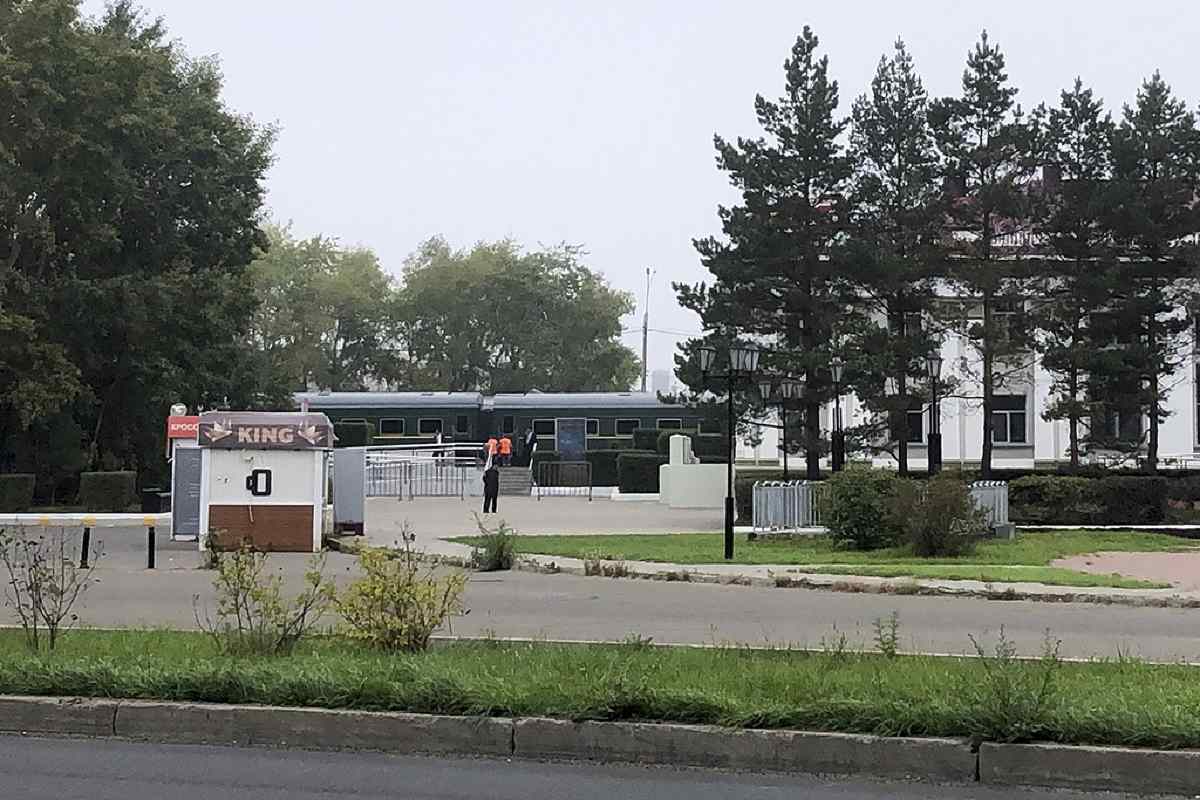
The special train of North Korea’s leader Kim Jong Un is seen at the railway station upon his arrival by in Komsomolsk-on-Amur, about 6200 kilometers (3,900 miles) east of Moscow, in the Russian Far Eastern Amur region, on Friday, Sept. 15, 2023.
11:09 JST, September 15, 2023
SEOUL, South Korea (AP) — North Korean leader Kim Jong Un arrived Friday in Komsomolsk-on-Amur in far eastern Russia and is expected to visit a plant that builds fighter jets as South Korea has said it’s concerned his visit is focused on expanding military cooperation in a possible arms-for-technology deal.
The visit to Komsomolsk-on-Amur is one of several the North Korean leader is making on a days-long trip to Russia. Arriving on an armored train from North Korea, he rolled into Russia Tuesday and was met by officials at a station near the Russia-North Korea border.
After a long train trip north, on Wednesday Kim met President Putin at the Vostochny Cosmodrome and was greeted by Putin with a 40-second handshake. On Thursday, he largely disappeared from view, before reappearing local time Friday.
Russian state news agency RIA Novosti published a video which showed Kim’s train pulling into the station as North Korean officials waited by a specially constructed ramp and red carpet. Shortly afterwards, his convoy swept out of Komsomolsk-on-Amur station.
Putin told Russian state TV after the summit that Kim would visit an aircraft plant in Komsomolsk-on-Amur, and then go to Vladivostok to view Russia’s Pacific Fleet, a university and other facilities. The visit to the aircraft plant would possibly hint at what Kim seeks to gain from Russia in exchange for help fueling Putin’s war on Ukraine.
Washington warned that Kim and Putin’s summit could lead to a deal for North Korea to supply Moscow with ammunition and there is widespread concern in Seoul that North Korea would in return receive advanced weapons technologies from Russia, including those related to military spy satellites, which would increase the threat posed by Kim’s military nuclear program.
“We express our deep concern and regret that despite repeated warnings from the international community, North Korea and Russia discussed military cooperation issues, including satellite development, during their summit,” said Lim Soo-suk, South Korea’s Foreign Ministry spokesperson Thursday.
“Any science and technology cooperation that contributes to nuclear weapons and missile development, including satellite systems that involve ballistic missile technologies, runs against U.N. Security Council resolutions,” he said in a briefing.
Lim also pointed out that Kim’s delegation in Russia includes several people sanctioned by the Security Council over involvement in illicit North Korean weapons development activities, including Korean People’s Army Marshal Ri Pyong Chol and Jo Chun Yong, a ruling party official who handles munitions policies. Lim said Moscow should realize there will be “very negative impacts” on its relations with Seoul if it proceeds with military cooperation with North Korea.
Before Kim’s arrival, traffic police in Komsomolsk-on-Amur blocked the entrance to the station with a police car and ticker tape — prompting passengers who were still arriving on scheduled trains to lift it up to move past. Some residents were pictured peering out from their balconies to watch as Kim’s convoy swept past. Shortly after Kim’s convoy left the station, a group of women in Russian national costumes and headdresses, presumably part of a welcoming party, were pictured leaving. Flowers were also planted near the station and residents were told roads would be closed from 6 a.m. to 1 p.m. on Friday so that the North Korean leader’s car could travel through the city, according to local Telegram channels.
The map of road closures shared by one Telegram channel showed closures from the station, across town to an area where the Komsomolsk-on-Amur Aircraft Plant is based.
South Korean Unification Minister Kim Yung-ho, who handles affairs with North Korea, warned that potential arms transfers between the North and Russia would invite stronger responses from South Korea, the U.S. and Japan, which have been stepping up their trilateral security cooperation to cope with regional threats.
White House National Security Council spokesperson John Kirby said Wednesday that North Korea would face consequences if it supplies arms to Russia.
“No nation on the planet, nobody, should be helping Mr. Putin kill innocent Ukrainians,” Kirby said. If the countries decide to move forward with an arms deal, the U.S. will take measure of the arrangement and “deal with it appropriately,” he said.
The world has been largely relying on Russian and North Korean media for information about Kim’s diplomacy in Russia, which underscores an aligning interest between the nuclear-armed countries locked in escalating tensions with the West.
A day after giving intense coverage to the summit, Russian media outlets were largely silent about Kim’s whereabouts Thursday. North Korean state media have been reporting on his activities in Russia a day late and crafting their reports to support the government’s propaganda needs.
North Korea’s official Korean Central News Agency said on Thursday that Kim had invited Putin to visit North Korea at a “convenient time” and that Putin accepted with “pleasure and reaffirmed his will to invariably carry forward” the history of friendship between the nations.
Kremlin spokesman Dmitry Peskov confirmed that Putin had accepted the invitation and said Russian Foreign Minister Sergey Lavrov is expected to visit North Korea in October.
During their meeting on Wednesday at Russia’s spaceport in the Far East, Kim vowed “full and unconditional support” for Putin in what he described as a “just fight against hegemonic forces to defend its sovereign rights, security and interests,” in an apparent reference to the war in Ukraine.
The decision to meet at the Vostochny Cosmodrome suggested that Kim is seeking Russian help in developing military reconnaissance satellites. He has previously said they are crucial to enhancing the threat of his nuclear-capable missiles. North Korea has repeatedly failed to place spy satellites into orbit.
Some analysts question whether Russia, which has always closely guarded its sensitive weapons technologies, would be willing to share them with North Korea in exchange for what may end up being limited supplies of munitions moved slowly through their small land link.
They say military cooperation between the countries could be more about conventional capabilities, such as Russia possibly helping North Korea improve its badly aged air force that remains reliant on fighter jets sent by the Soviet Union in the 1980s.
Putin told reporters that Russia and North Korea have “lots of interesting projects” in spheres like transportation and agriculture and that Moscow is providing its neighbor with humanitarian aid. But he avoided talking about military cooperation, saying only that Russia is abiding by the sanctions prohibiting procuring weapons from North Korea.
Wednesday’s meeting came hours after North Korea fired two ballistic missiles toward the sea, extending a highly provocative run in testing since 2022, as Kim used the distraction caused by war in Ukraine to accelerate his weapons development.
"News Services" POPULAR ARTICLE
-

American Playwright Jeremy O. Harris Arrested in Japan on Alleged Drug Smuggling
-

Japan’s Nikkei Stock Average as JGB Yields, Yen Rise on Rate-Hike Bets
-

Japan’s Nikkei Stock Average Licks Wounds after Selloff Sparked by BOJ Hike Bets (UPDATE 1)
-

Japan’s Nikkei Stock Average Buoyed by Stable Yen; SoftBank’s Slide Caps Gains (UPDATE 1)
-

Japanese Bond Yields Zoom, Stocks Slide as Rate Hike Looms
JN ACCESS RANKING
-

Keidanren Chairman Yoshinobu Tsutsui Visits Kashiwazaki-Kariwa Nuclear Power Plant; Inspects New Emergency Safety System
-

Imports of Rare Earths from China Facing Delays, May Be Caused by Deterioration of Japan-China Relations
-

University of Tokyo Professor Discusses Japanese Economic Security in Interview Ahead of Forum
-

Tokyo Economic Security Forum to Hold Inaugural Meeting Amid Tense Global Environment
-

Japan Pulls out of Vietnam Nuclear Project, Complicating Hanoi’s Power Plans


